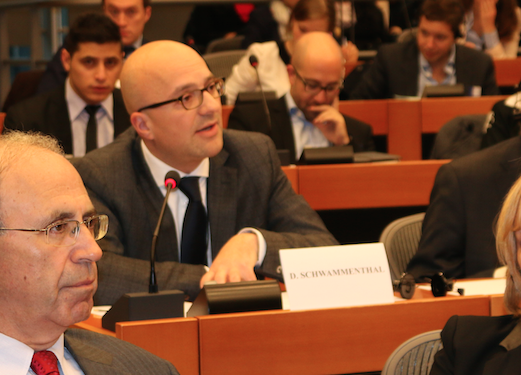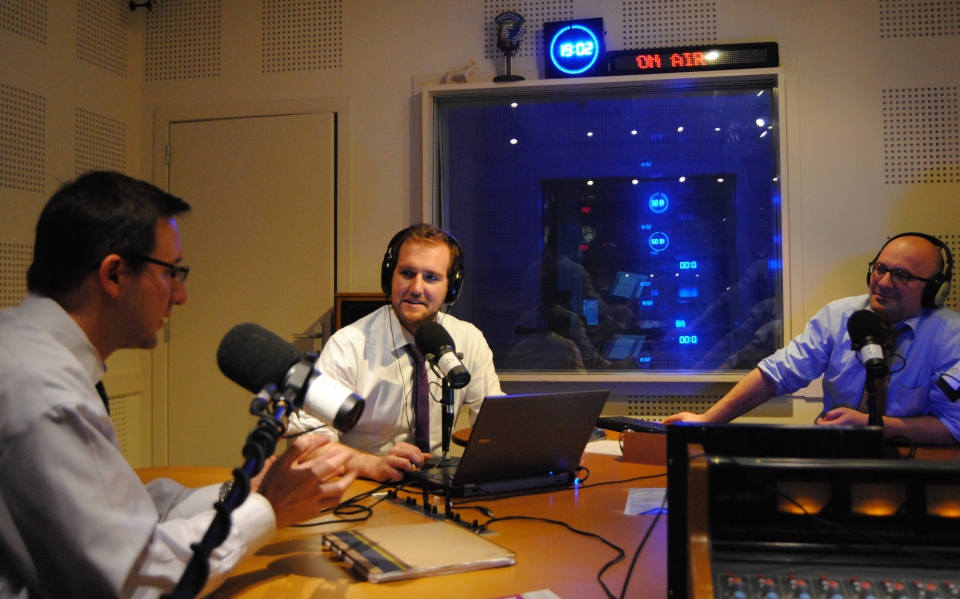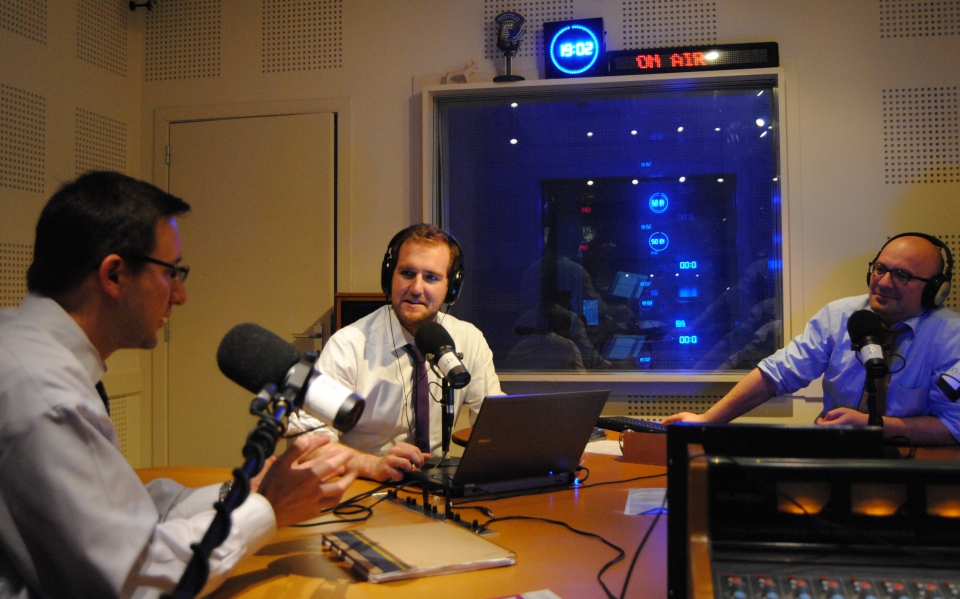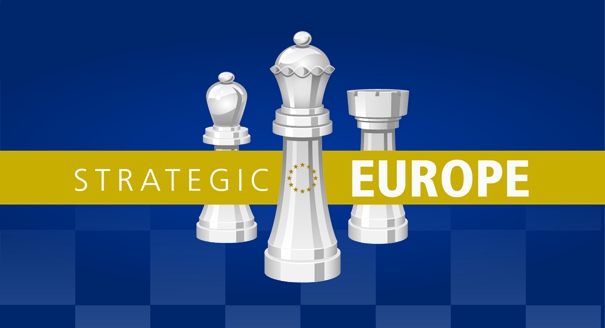Analysis
Remarks: TAI Director Daniel Schwammenthal addresses European Parliament Hearing on Iranian Threat
"Iran’s Progress Toward Weapon Grade Material"
European Parliament Hearing on Iran and the Containment Trap
20 March 2013
Daniel Schwammenthal: "Thank you very much for the kind invitation to speak here today. It is a great honor.
This is actually my second talk to you about Iran’s nuclear weapons program. In my first presentation in November 2011, I underlined how the regime’s enrichment capability at the time put it in a position to produce enough weapons grade uranium for one nuclear device in 62 days, according to Stephen Rademaker and Blaise Misztal of the Washington-based Bipartisan Policy Center.
Now, 16 months, four rounds of negotiations and several packages of economic sanctions later, Iran has cut this break out time by 30%. Using data from the International Atomic Energy Agency, the Wisconsin Project on Nuclear Arms Control estimates that with “the approximately 9,000 centrifuges operating at its Natanz Fuel Enrichment Plant, Iran could theoretically produce enough weapon-grade uranium to fuel a single nuclear warhead in about 1.5 months.” Furthermore, “Iran's stockpile of low-enriched uranium is now sufficient, after further enrichment, to fuel approximately five nuclear warheads.”
This assessment does not even include yet the impact of Iran’s recent announcement, made just ahead of the latest talks with the E3 Plus 3, that they were installing up to 3,000 more advanced centrifuges in Natanz. This new equipment can enrich uranium up to five times faster than the current generation of centrifuges. IAEA inspectors have reported that already 180 of these new machines have been installed. Iran is thus fast approaching a situation where it may be able to outrun inspectors from the IAEA and Western intelligence services and produce enough weapon grade material for a bomb without being detected.
As the IAEA says in its latest report: "The director general is unable to report any progress on the clarification of outstanding issues including those relating to possible military dimensions to Iran's nuclear programme." Giving this lack of progress, the E3 Plus 3 apparently decided last month to sweeten the deal, adopting a strategy that could be described as “more for less.” The six powers offered more sanction relief for less Iranian compliance. Tehran would no longer have to shut down its illegal underground facility in Fordow as previously demanded but merely suspend enrichment there and take a series of steps that would make it hard to quickly resume production there. The six also agreed, in another apparent softening, that Iran could keep a small amount of 20% enriched.
Not surprisingly, Tehran struck an upbeat note, calling this "a turning point," but equally unsurprising, it did so without accepting any of the softened demands, warning instead that "there is a long distance to reach the suitable point." All the two sides agreed to in the end was to meet yet again: Technical experts met actually yesterday in Istanbul, while the negotiations at the higher political level would resume, again in Almaty, on April 5 and 6. All we can say for sure is that Tehran won another six weeks or so during which its thousands of centrifuges can continue enriching uranium.
Western officials kept at first quiet about how they felt about the talks in Kazakhstan but a few days after Almaty, we got a glimpse into what they really think about their Iranian negotiating partners: In a joint statement delivered at a board meeting of the IAEA two weeks ago, the EU called Iran’s plans for more advanced centrifuges a "cause for serious concern.”
The EU also criticized as “unacceptable” Iranian stonewalling of a U.N. nuclear agency inquiry into suspected atom bomb research. The IAEA has intelligence that Iran has built a blast chamber for testing nuclear-weapons components at its Parchin military complex but the Iranians refuse access. Satellite images show what looks like frantic cleaning up operations to cover any tracks of their nuclear experiments.
Even though the negotiations and most of the international coverage of Iran’s nuclear program focus on enrichment, the Parchin facility and Iran’s related activities are equally worrying and deserve our attention as they provide further indications of Tehran’s true intentions. In order to build a nuclear bomb you need more than just enriched uranium and Iran has in effect worked on all the other elements required for a bomb as well, elements that are technically far less challenging than enrichment. The IAEA has documented Iranian experiments on nuclear triggers, work on computer models of nuclear explosions and advanced research on warheads that could be fitted on and delivered by the sort of medium-range missiles Iran owns.
Flexible Fatwas
And yet, there are still voices playing down the Iranian threat. Some cite a fatwa by Supreme Leader Ayatollah Khamenei allegedly forbidding the production of nuclear bombs as evidence that the concerns about Iran’s nuclear program are overblown.
One would think that a regime that over 30 years has murdered tens of thousands of its own people, orders the public hanging of homosexuals, the stoning of women, tortures and executes dissidents and religious minorities, is the world’s chief sponsor of terrorism, and has been repeatedly caught lying about its nuclear program would be met with a little more skepticism—Even when the leader responsible for all these crimes couches his reassuring messages in religious terms.
It was Ayatollah Khomeini himself who pointed out that fatwas are not written in stone: “The government can unilaterally abrogate any religious agreement made by it with the people if it believes that the agreement is against the interests of the country and Islam. The government can prevent any Islamic law from being implemented if it sees its implementation as harmful to the interests of Islam," he said in 1987.
Mehdi Khalaji, one of the foremost scholars of Iranian Shiite doctrine in the West, (he studied in the religious seminaries of Qom, the traditional center of Iran's clerical establishment, where also Khomeini and Khamenei studied) warns against taking The Supreme Leader's words at face value. "Should the needs of the Islamic Republic or the Muslim umma change, requiring the use of nuclear weapons, the Supreme Leader could just as well alter his position in response. This means that, ultimately, the Islamic Republic is unconstrained—even by religious doctrine—as it moves toward the possible production and storing of nuclear weapons.”
So really, on the issues of fatwas, there is no need for us to be more Shiite than the Ayatollah.
Containment Is Not an Option
MAD Is No Deterrent for Religious Fanatics.
At the same time as some commentators try to play down the possibility of Iran even desiring nuclear weapons, there are those who present an Iranian bomb almost as a fait accompli and encourage us to simply live with it, if not learn to love it.
Former German diplomat Wolfgang Ischinger, for example, the host of the annual Munich Security Conference and a big voice in Germany’s foreign policy debate, believes the danger could be contained. "If it was possible to deter the Soviet Union successfully, then that will probably be possible with Iran as well.” And former British Foreign Secretary Jack Straw, who together with French foreign minister Dominique de Villepin and his German colleague Joschka Fischer led the unsuccessful talks with Iran in the early 2000s, argued in a recent Daily Telegraph op-ed that “Containment is a better response than conflict.”
Even though Mr. Straw complains in this same op-ed about how opaque the Iranian regime is, he feels nevertheless confident to predict that an Iranian attack on Israel or an Arab country would be “highly improbable” and that in his “own best judgment,” Iran’s Supreme Leader, Ayatollah Khamenei, “probably“ will stop short of producing an actual bomb. Mr. Straw doesn’t find it necessary though to provide any evidence in support of his thesis.
The idea that containment is a supposedly viable policy option thus remains a popular misconception and therefore warrants rehashing at least some of the arguments I’ve made here previously.
As we all know, there were several occasions when the Cold War almost turned hot despite mutually assured destruction, most notably during the Cuban Missile Crisis. But as dangerous as it was to play MAD with the Godless Soviet Union, it would be far more dangerous to try to replay it with the God-fearing mullahs. For some of them, mutually assured destruction might be more of an incentive than a deterrent. To cite Bernard Lewis, the eminent British scholar on the Middle East: “We know already that [the mullahs ruling Iran] do not give a damn about killing their own people in great numbers. In the final scenario, they are doing them a favor. They are giving them a quick free pass to heaven and all its delights.”
It is quite baffling why in Europe, with its recent history of totalitarianism, genocide and ethnic cleansing, the idea that the mullahs may really mean what they say about Israel is considered by many as too absurd to be taken seriously. Professor Gregory Stanton, one of the world’s foremost authorities of genocide studies, he is the founder and director of Genocide Watch, is less complacent.
“One of the best predictors of genocide is incitement to genocide and I believe that is exactly what Iran is doing today." Ignoring these early signs, he said, "dismissing them as diabolical rhetoric or as a tactic meant to advance a different goal, is to enable the perpetrators."
When it comes to such issues as the environment, we have here in Europe adopted the “precautionary principle,” allowing us for example to ban substances without conclusive scientific evidence that they are harmful. But when it comes to possible nuclear war and genocide, the advice we get from politicians like Mr. Straw boils down to “It will probably work out just fine.” This is neither responsible nor serious security policy.
The usual counterargument is that the power in Iran is supposedly held by more rational, moderate people than say President Mahmoud Ahmedinejad. But is that really true? The West lacks good intelligence about the inner workings of Iran’s decision-making process. But one thing we do know is that at the center of power is the Supreme Leader. Former Spanish Prime Minister Jose Aznar recalled a meeting in which the Supreme Leader Khameini quite bluntly told him: "Israel must be burned to the ground.”
Besides, who counts as a moderate anyway? Former Iranian President Hashemi Rafsanjani—usually counted among the so-called pragmatic or moderate—suggested in 2001 that his country would not be deterred by the fear of nuclear retaliation: “Application of an atomic bomb would not leave anything in Israel, but the same thing would just produce damages in the Muslim world.”
These statements and I could have added countless more by Revolutionary Guard commanders, religious authorities and others, underline that it is rather dangerous to assume that Iran’s clerical regime shares the West’s concept of “rationality” or “moderation.” The 2011 plot to assassinate the Saudi ambassador in a Washington restaurant, which would have also killed many American civilians, is a case in point. If successful, it would have constituted an act of war against the world’s only remaining superpower—probably not exactly what at least in this room would be considered rational behavior.
One theory holds that this planned attack may have been the work of rogue elements in Iran. If correct, though, this would hardly be reassuring. It would raise serious questions about Iran’s unity of command. What if such “rogue” elements would also get their hands on nukes?
And even if we could be confident that deterrence would work with Iran’s current leadership in the present circumstances, it’s impossible to give any reassurances for the future. For example, imagine another uprising in Iran like the one in 2009, but this time turning more violent and successful. Would Iranian leaders facing their imminent demise and possible death in case of the rebels’ expected success still be deterred by MAD?
The Flawed Cold War Analogy
But even if we could say with absolute certainty that Iran’s threats are just posturing and that its decision-making is forever guided by rational thought, there is a more fundamental problem with the Cold War analogy. One absolutely essential element for containment to work is that the two sides have clear channels of communications, and have a modicum of trust and knowledge about their opponents. Despite the US-Soviet Union rivalry, the two sides had such direct channels (remember those famous red telephones?) and a good understanding of how the other side's political system works. Nothing of this sort exists between the U.S. and Israel on one side and Iran on the other. There are no diplomatic relations to provide for contacts and insights into the other side. And far from having "red telephones," you cannot even make regular phone calls between Israel and Iran. So even if the Iranians accepted the basic logic of deterrence, the risks of nuclear war by misunderstanding, technical error or miscalculation could prove unmanageable.
The idea of trying to contain a nuclear Iran also overlooks the fact that Tehran’s acquisition of the bomb would kill the Non-Proliferation Treaty and trigger a nuclear arms race in the region. Countries such as Saudi Arabia or Turkey will not rely on Western promises to protect them from a nuclear Iran after the same West reneged on its promise to prevent a nuclear Iran in the first place. Unlike during the Cold War, when there were only two main nuclear players, we would be facing a fragile standoff among several, unstable actors, greatly enhancing the risks of accidental atomic war. With so many nuclear actors, any of the region's numerous unresolved conflicts could suddenly become the trigger for a nuclear exchange.
A quick word about the concerns raised by some former Israeli spy chiefs, which have been somewhat misinterpreted in the West, including by Mr. Straw in his recent op-ed. Let’s focus on Meir Dagan, the Former Mossad Chief credited with substantially delaying Iran's nuclear program through covert operations. He is probably the most important critique cited in the Western press and his quote that an attack on Iran is the “Stupidest Idea' I’ve Ever Heard” went around the world. His later qualifications received less attention though. Mr. Dagan subsequently explained: “This was a miserable quote that was said absentmindedly. Let’s set the record straight. I think the Iranian nuclear capacity is a threat with strategic implications for Israel.”
When Mr. Dagan was asked about his original quote last year on 60 minutes, a famous US political affairs program, he elaborated that what he meant was that an “attack on Iran now before exploring all other approaches is not the right way how to do it [sic]."
The Threat to the West and the Region
The Costs of Inaction
A nuclear armed Islamic Republic, though, would not only be a threat to Israel but the entire region as well as for Europe and the US. Tehran is not satisfied with producing missiles that can only reach Israel. Its rockets can already hit parts of Southern and Eastern Europe and it will soon be able to target the entire EU. Tehran is also working on a space program, providing it with the technology for intercontinental ballistic missiles that in a few years may bring the US within its reach. The fact that Iran is spending a lot of money and scarce resources to upgrade its missiles to bring Western cities within its range should be a matter of grave concern for European policy makers.
Europe must also not overlook Tehran's role as the world’s chief sponsor of terrorism. Hezbollah, for example, with its global network of supporters, including here in Europe, is fully integrated into the command structure of the Iranian Revolutionary Guards. Osama bin Laden's son-in-law, Sulaiman Abu Ghaith, now on trial in New York, is one of several Al Qaeda operatives who has spent years living in Iran under still unclear circumstances. The Iranian regime could simply circumvent the logic of MAD by passing on a bomb, dirty or fully operational, to terrorists, thus escaping retaliation altogether. If a bomb went off in Western city, it could be months before it was ever identified as possibly Iranian. And even then, according to US officials cited in a November 2011 New York Times report, confidence in the conclusions might be too low for any president to order retaliation. It is hard to imagine any Western leader ordering a nuclear strike, and thus the deaths of untold numbers of Iranian civilians, on the basis of inconclusive evidence months after the initial attack. Tehran would be quite rational to count on Western scruples in such a case. This is a threat that Europe, with its open and porous borders, large Iranian communities that could give easy cover for regime agents, and networks of Hezbollah activists and Al Qaeda cells, will ignore at its own peril.
Finally, containment advocates fail to contemplate the strategic and regional implications of a nuclear Iran even if atomic war could really be avoided. Iran would be able to leverage the mere possession of the bomb to advance its destabilizing policies. Iran has for years armed and trained insurgents and terrorists in Iraq and Afghanistan, causing the deaths of numerous allied soldiers. Tehran was also directly involved in terror attacks around the world, from Saudi Arabia to Argentina and now, through its proxy Hezbollah, also here in Europe, as the recent terror attack in Bulgaria demonstrated. Its forces are currently assisting in the butchery in Syria to keep Assad in power. If this is what a conventionally armed Iran is doing, imagine what a nuclear-armed Iran, one that may consider itself, rightly or wrongly, untouchable, will do. Using threats and proxies, Tehran could use its nuclear leverage to bring the Gulf region under its control. This is exactly what Iran's Arab neighbours fear.
One of the most revealing exchanges brought to light by the Wiki leaks were of Arab, not Israeli, leaders urging Americans to attack Iran. “Cut off the head of the snake,” is how the Saudi Ambassador in Washington put it to General Petraeus, for example. That’s the same Saudi Ambassador, by the way, the Iranians later tried to assassinate in a Washington restaurant. Now we know why.
What we have here is an explosive cocktail of Arab-Persian rivalry that dates back to pre-Islamic times, compounded by the increasingly vicious and violent Sunni-Shiite split, and fueled by an Islamic Republic that to this day remains a revolutionary regime, one eager to expand its power to assume what it considers is its rightful place, namely at the center of the Muslim World. Tehran is thus fanning the flames of violence in neighboring Bahrain, where a majority-Shiite country is controlled by a Sunni-minority. Saudi Arabia, which controls Islam’s holiest sites, Mekka and Medina, has its own, suppressed Shiite minority that make up about 15% of the population. And just to make things more interesting, they happen to reside primarily in the oil-rich Eastern Province of Al-Qatif, just opposite Iran on the other side of the narrow Persian Gulf and right next to Bahrein. Who would really stop a nuclear-armed Iran from “coming to the help” of its Shiite brothers in Saudi Arabia, Bahrein and elsewhere?
Those worried about the risks of doing what it may take to prevent a nuclear-armed Iran, and those risks are real, usually fail to contemplate the equally real and, potentially much more dangerous risks of inaction. Let's just focus on the economic costs alone for a moment. Much has been said and written about how a military strike would lead to a spike in oil prices. Prices, though, would likely return to their previous level after the end of any confrontation.
The day after an Iranian atomic test, however, when oil traders will have to factor in all the implications of a nuclear Iran, oil prices will also rise. But given the nature of the problem, this price rise might be permanent. A study by the Washington Institute for Near East Policy, co-authored by Dennis Ross, estimates that once Iran crosses the nuclear threshold, oil prices could rise by 10% to 25% in the first year alone and 30% to 50% within three years. The effects would be much graver, of course, if a nuclear Iran were to take military action against any of its neighbours.
Policy makers, just like business leaders, often focus too much on the immediate implications of their actions. Strategic thinking requires that Europe's leaders also consider the long-term costs of allowing Iran to go nuclear.
Thank you."




